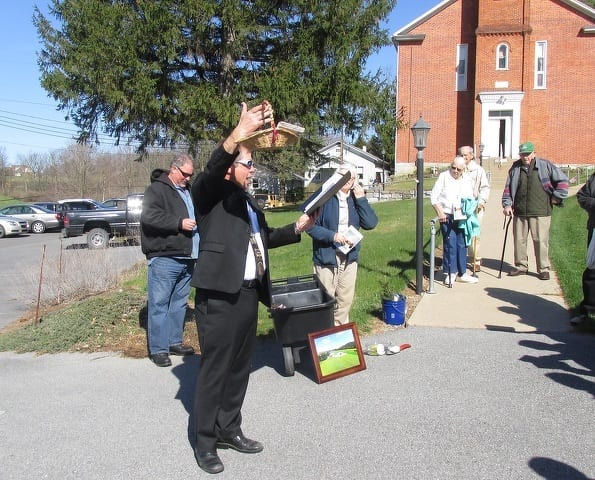TUSSEYVILLE — In its 206-year history, the Emmanuel Union Church in Tusseyville has seen many kinds of church services. Last Sunday, a congregation of about 40 people gathered in the church community room for a rather unusual service — the “Blessing of the Tractors.”
Though somewhat rare in modern times, the concept dates back centuries, to well before the existence of modern motorized equipment. In medieval times, the blessing was called rogation, from a French word meaning ‘to beseech.’ The people of those times asked God to bless their crops, and also asked to be delivered from plagues and natural disasters.
As time passed and agricultural mechanization increased, the blessings evolved into prayers for the proper functioning of tractors and other equipment essential to producing abundant, quality crops, as well as for the safety of the farmers.
The service began with music, prayers, responsive readings and a sermon, then adjourned to the church parking lot, where a John Deere tractor owned by a local farmer was parked. Pastor Craig Munnell led the congregation in blessings of soil, seeds, water and the tractor, which represented all types of mechanized agricultural machinery. Munnell’s prayer included the biblical reference, “May we always beat our swords into plows, and our spears into pruning hooks.”
Munnell’s sermon reflected on the life of a farmer.
“A farmer lives with miracles daily — the miracle of the soil, the miracle of the rain, the birth of a cow, the sun, the germination of seeds,” he said. “Each day is filled with hope and worry — hope that they will get through the day with enough food on the table and a roof over their heads, and worry that disaster is looming in that dark cloud in the distance.”
He noted that farming is sometimes romanticized by entertainment media, but it is hard work. “Sixty to 80 hours a week with no breaks,” he said.
The service concluded with the congregational singing of a hymn and a benediction praying for blessings on the land and water and all those who work upon them to produce food.



